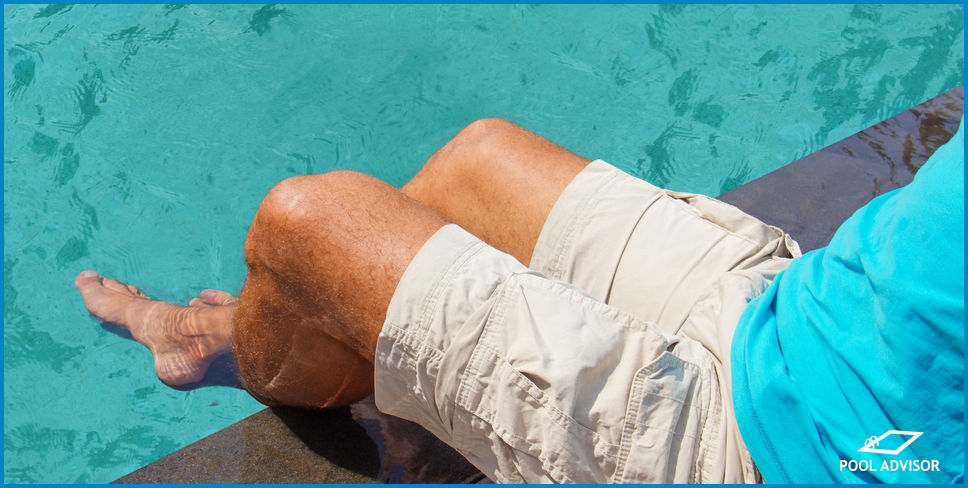
Pool Is Losing 1 Inch Of Water A Day - Is This Normal?
Pools tend to lose a certain amount of water on a daily basis through evaporation and regular use.
In warmer and drier weather, the rate of evaporation can increase, but if your pool is losing a lot of water, it could be a sign of something more serious. If you find your pool losing 1 inch of water a day, chances are that you have a leak.
In this article, we will discuss normal water loss from your pool, things that affect this rate, and how you can calculate normal evaporation rates for your pool.
We also include various signs that your pool is leaking, as well as what you should do if you suspect that your pool has developed a leak.
Normal Water Loss
A certain amount of water loss from a pool is normal, but this can vary based on a number of factors. Some of these are environmental factors, which include how much sunlight exposure the pool receives, outdoor temperature, humidity levels, and wind.
Certain aspects of your pool also affect the evaporation rate, such as the surface area of the water, whether you heat your pool or not, and the amount of water agitation caused by your filter. Pool covers will also substantially affect the water evaporation rate.
Even in a hot and dry environment, pools tend to lose a maximum of half an inch of water per day through evaporation. Water loss can be higher when many people are using the pool.
If you are unsure what a normal rate of evaporation should be for your pool, you can figure it out using our handy pool rate evaporation calculator.
To use this calculator, you will enter the surface area of your pool and choose your nearest city. If you do not know the surface area of your pool, the calculator can help you work it out.
This evaporation calculator will tell you how much water loss you can expect from your pool each month in litres. Pools that are losing more water than this on a regular basis are often experiencing structural issues.
Signs Of A Leak
Pools losing an inch of water a day are typically experiencing a significant leak. Although some of this water loss is still attributable to evaporation, the rest is leaking out somewhere.
If your pool is experiencing a leak of this proportion or even larger, you are likely to notice other symptoms of this leak. Leaks can sometimes cause puddles to form in your lawn or around your pool equipment.
Signs of erosion may become obvious around the leak. Pool surfaces such as tile or pebblecrete may begin to form cracks and pieces may even fall off.
A leak in your pool can also lead to sanitary issues, such as dirt or algae being introduced to your pool. When water that has leaked from your pool accumulates underground, this debris can make its way back into your pool.
In the event of a leak, you will find yourself topping up your water regularly, which can lead to water chemistry issues. In particular, you will dilute out your chlorine, leaving you more vulnerable to algae and bacteria outbreaks.
These chemical issues are expensive to treat, and because the water continues to escape, you are essentially pouring money down the drain.
What To Do If Your Pool Is Leaking
If you suspect that your pool is leaking, stop adding more water to your pool. The most common leak that develops in in-ground pools occurs where skimmer baskets are attached to the concrete housing using a putty.
Once your pool has drained below this level, you can inspect this area for damage. If you prefer a DIY approach, you may be able to fix this type of leak yourself with the right equipment. However, it is advisable to contact pool leak detection professionals in these types of situations.
The longer a leak is left untreated, the more damage it can cause. A builder or leak detection expert will be knowledgeable about the structure of your pool and have many ways of locating and sealing leaks.
Not all pools that have leaks will need to be drained completely. It is important to have a professional diagnose the cause and location of your pool’s leak before a treatment option is recommended.
Conclusion
Pools losing one inch of water a day are typically experiencing a leak. Even in the summer months, the amount of water lost to evaporation rarely creates drops as large as half an inch over the course of the day.
If you suspect that your pool has a leak, it’s important to seek the help of a trusted pool professional as quickly as possible to prevent more damage from occurring.
Do you have any questions about your pool losing water? Leave us a comment down below, we’d love to help!

Louis
A chemical engineer by trade, Louis is committed to debunking myths in the pool industry by explaining the underlying chemistry and making it accessible to all.
